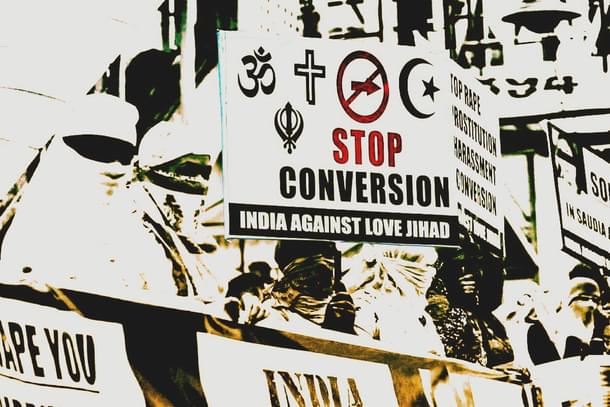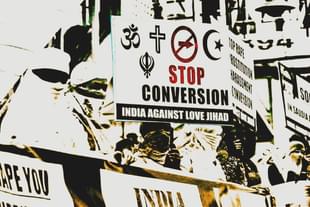Politics
Law Can’t Curb Love Jihad, Which Is A Double Attack On Rights Of Both Hindu And Muslim Women
R Jagannathan
Nov 18, 2020, 12:06 PM | Updated 12:51 PM IST
Save & read from anywhere!
Bookmark stories for easy access on any device or the Swarajya app.


Some Bharatiya Janata Party (BJP) ruled states, including Haryana, Madhya Pradesh, Uttar Pradesh, and possibly even Karnataka, are considering legislation to minimise the incidence of love jihad – a phenomenon that can be loosely defined as a Hindu woman converting to marry a Muslim. (Read here, here, here)
Though the conversion pressure can go the other way too – of a Hindu boy being asked to convert if he wants to marry a Muslim girl – the anecdotal evidence suggests that the trend is largely in one direction, of Hindu girls and young women converting away from the religion of their birth.
The problem is that laws cannot deal with an issue that relates to society and its attitudes to religion. A law to prevent love jihad may, on the contrary, tend to give false comfort to Hindus, who worry about such conversions when no law can prevent anyone from changing his or her faith, covertly if not overtly.
Hindus look for simplistic solutions where none exist. Many states have banned “forced” conversions, but this has not prevented the long-term trend of tribals or non-tribals moving away from Hinduism.
Similarly, a ban on conversions before marriage will not solve a problem that emanates from what is intrinsic to Islam: the duty of Dawa, of spreading the faith, that is enjoined on every Muslim. It should, therefore, be no surprise that some use the ruse of marriage to achieve conversions, even though the love may be substantially genuine.
Given that this driving force to convert “pagans” and “non-believers” also exists in Christianity, one should presume that the same pressures operate on any non-Christian woman seeking to marry a Christian, especially if the marriage is solemnised in a church with blessings from the clergy.
To marry a Christian in a church is no different from marrying a Muslim through a niqah, for both require conversions. Among Hindus, marriage is more about the rituals practised by a particular sampradaya, and a Hindu-style wedding of an inter-faith couple does not involve an active conversion angle.
Put simply, there is no legal route away from love jihad, except by stressing women’s rights and free choice – and educating them about it. Most cases of love jihad happen because Hindu leaders and the government have simply not explained to the larger society what happens when they – men or women – marry in a church or opt for a niqah.
The only legal thing that the government can do is to make the Special Marriages Act, or civil marriage, applicable to all inter-faith marriages, or better still, to all marriages. The religious ceremony of any community can thus retain its cultural significance, but with no legal sanction beyond affirmation that two people have tied the knot willingly.
Making things worse is the inherent weakness of Hinduism, which does the exact opposite of what Islam and Christianity do: the latter make it easy for someone outside the faith to convert into their own and make the reversal of the process difficult.
Hinduism does the exact opposite: make it easier to opt out, and extremely difficult to opt in and become a Hindu. It is just not about caste; at one point, organisations like the Arya Samaj had found ways of seeking conversions, but now only the Sangh’s ghar wapsi programme is at work. Unless Hindus in general adopt practical conversion techniques and strategies, they are going to lose the war of numbers.
Coming specifically to love jihad, it is essentially a double blow to women’s rights; one is the rights of Hindu women who throw away their religious and identity rights if they opt to convert to Islam; the other is the denial of similar rights to Muslim women who may want to marry outside their faith, but are restricted by cultural pressures to cover their faces, avoid the company of men outside the family, and generally forced to conform to patriarchal demands.
If their men marry women from another faith, or marry twice over, Muslim women pay the price. Love jihad is thus about a denial of women’s rights in both communities. It is worth recalling that Hindu men seeking to court Muslim women have often been killed for their temerity (read here, here, here, here). Any Muslim woman who dares to think of marrying outside the faith thus faces the prospect of getting her love murdered.
What is needed is a general public educational campaign where women of all faiths are told which rights the Constitution provides them regardless of faith and which rights they give up based on which community they marry into. They also need to be informed that no faith can tell them what to do, and love ought to be about love and not their religious or cultural identities. Reformist Muslims must also be encouraged to openly affirm that apostasy will not be a crime even in Islam.
Hindus have an additional job to do. They need to prepare themselves for enabling conversions into their fold. Simple reason: the Abrahamic faiths are not going to be less conversion oriented no matter what the law says. To defend Hinduism, they need to be on the conversion offensive. These capabilities can be created over time, but the key is commitment to do it.
A disarmed community is in no position to fight another that comes fully armed to a battle of conversions.
Jagannathan is former Editorial Director, Swarajya. He tweets at @TheJaggi.





